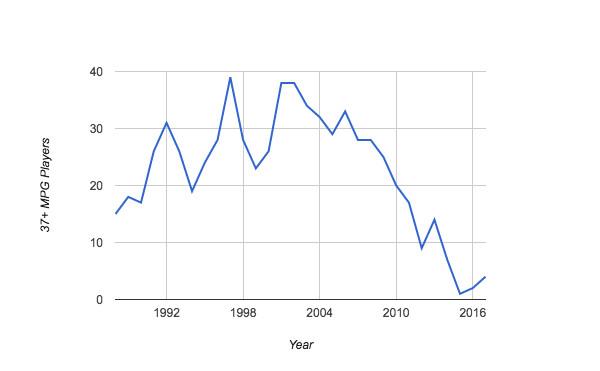Today is LeBron James Day on The Ringer. We figured nothing else was happening in the NBA world, so why not celebrate Bron, right? Thanks, Vlade and Vivek! Seriously, though, LeBron is having such an interesting season — on top of the most interesting career — and we wanted to look backward and forward with a collection of short posts about him. You can find all the posts here. Go ahead and make your trades. There’s only one King.

Only LeBron James knows if he’s really playing too many minutes, and he doesn’t seem concerned about the issue. “I’ll rest when I retire,” he told reporters last week. But that reassurance hasn’t stopped a clamor of voices across the basketball landscape — including that of his own coach — from suggesting that the Cavaliers star needs more rest in the season’s second half if Cleveland is to contend for another title.
At 37.5 minutes per game, James is second behind Kyle Lowry for the league lead; in his age-32 season, he’s the oldest player in the top 20 in the category. His workload isn’t unprecedented — at 32, Wilt Chamberlain averaged more than 45 minutes per game, for instance — but given the context of both leaguewide trends and James’s playing history, it is a cause for concern, “rest when I retire” sentiments or not.
Due to a variety of factors, from more proactive training staffs to more physically taxing styles of play, minutes totals no longer reach the extremes they did in previous decades. James ranks second in MPG this season, but in 2007, he wouldn’t have cracked the top 20; in 1997, he wouldn’t have cracked the top 30.
In that 1996–97 season, 39 qualifying players averaged 37-plus minutes per game; that’s more than the number who have exceeded that mark over the past six seasons combined. Here’s the trend in graphical form, showing the number of players breaking the 37-MPG mark each year over the past three decades:

The pattern applies to older players in a similar fashion. From 1998 to 2007, there were 22 instances of a player exceeding 37 MPG at the age of 32 or older, but James this year marks just the fifth such occurrence in the decade since. Michael Jordan playing heavy minutes in his 30s was par for his era’s course, while James doing the same in today’s more rest-conscious league makes him an outlier. Jordan also took a near-two-year hiatus from the game, giving him an actual chance to rest when he (temporarily) retired, while James has experienced the sport’s most grueling multiyear postseason slog ever.
James’s burden is further compounded by the workload he endured early in his NBA career. While many of his peers were playing just 30 or so games a year in college, James was playing 80 minutes-heavy games as a teenager, allowing him to accrue massive minutes totals. No player in NBA history amassed more minutes in either the regular season or playoffs through his age-31 season than James, and only Kobe Bryant is within 5,000 minutes of James’s combined total.
Combining regular-season and postseason minutes, only 13 Hall of Famers even have as many career minutes as LeBron, who has already passed Jordan, Bill Russell, and Oscar Robertson this season and is due to glide by Moses Malone, Scottie Pippen, Hakeem Olajuwon, and Shaquille O’Neal by June. By the time they had reached James’s current minutes total in their respective careers, Malone was a 39-year-old Spur, Olajuwon a 39-year-old Raptor, and O’Neal a 37-year-old Cav, while a 38-year-old Pippen was going through the motions in his dispiriting return to the Bulls.
James, of course, is still just 32, and starring for a title contender instead of wheezing through the final games of his career. He has never missed extended time due to injury and might well be as indestructible as Logan’s eponymous character, but time trudges ever onward, and all those minutes add up. Which begs the question: Should James rest more before the playoffs?
Head coach Tyronn Lue said as much last month, though his actions contradict those words. Through January 23, James was averaging 37.5 minutes per game, the most in the league, prompting Lue to acknowledge, “It don’t matter the game, we still have to worry about our players’ safety and I shouldn’t have had [James and Kyrie Irving] out there that long.” Lue was responsive and direct, and since those comments, James’s playing time has … nudged upward to 37.8 MPG, third most in the league in that span.
And with Kevin Love out for at least another month, it appears that the Cavs need to play James even more minutes the rest of the season. When Kyrie Irving is on the floor without either James or Love, the Cavs hold a negative-16.3 net rating, per NBA Wowy, which is twice as bad as Brooklyn’s margin as a team this year. With Cleveland only three games ahead of Boston for the Eastern Conference’s top seed, James taking more DNP-Rests or cutting his per-game numbers could prove costly.
Dropping back a seed in the standings would by no means harm Cleveland’s chance of qualifying for the Finals, though, and if that’s the potential trade-off needed to ensure its star’s freshness in the playoffs, it’s worth it for Lue and the Cavs. James had the top seed in the Eastern Conference just twice in the seven seasons he reached the Finals, and Cleveland just won a Game 7 on the road against a Golden State team that had gone 39–2 at home in the regular season. James and Co. would likely still storm through the Eastern Conference playoffs as the second seed.
Flanked by multiple All-Stars and capable role players, James ideally would have spent the season following the path fellow prep-to-pro draftee Kevin Garnett adopted a decade ago. Between 1997 and 2007, Garnett never averaged fewer than 37.9 MPG in Minnesota. After moving to Boston for his age-31 season, though, the Big Ticket never reached even 33 minutes per game again in the regular season, leaving him fresher for the playoffs, where anything — including a reversion to minute averages in the high 30s — is possibuuuuuhl.
That route is no longer feasible this season, but enjoying more overall rest, if not per-game rest, is still an option. James has sat out the second night of a back-to-back three times this year, but he’s also seen his minutes total climb as high as 45 in such games. He hasn’t had a game off since the day after Christmas. The Cavs have seven remaining back-to-backs, making up more than half of their schedule after the All-Star break. Most of the games on the second night of those back-to-backs — which includes two contests in Miami, and bouts against the Rockets, Celtics, and Wizards — have serious playoff implications for both sides. These may be juicy matchups, but the long game is more important. LeBron would do well to take his own advice and use those opportunities to relax.
